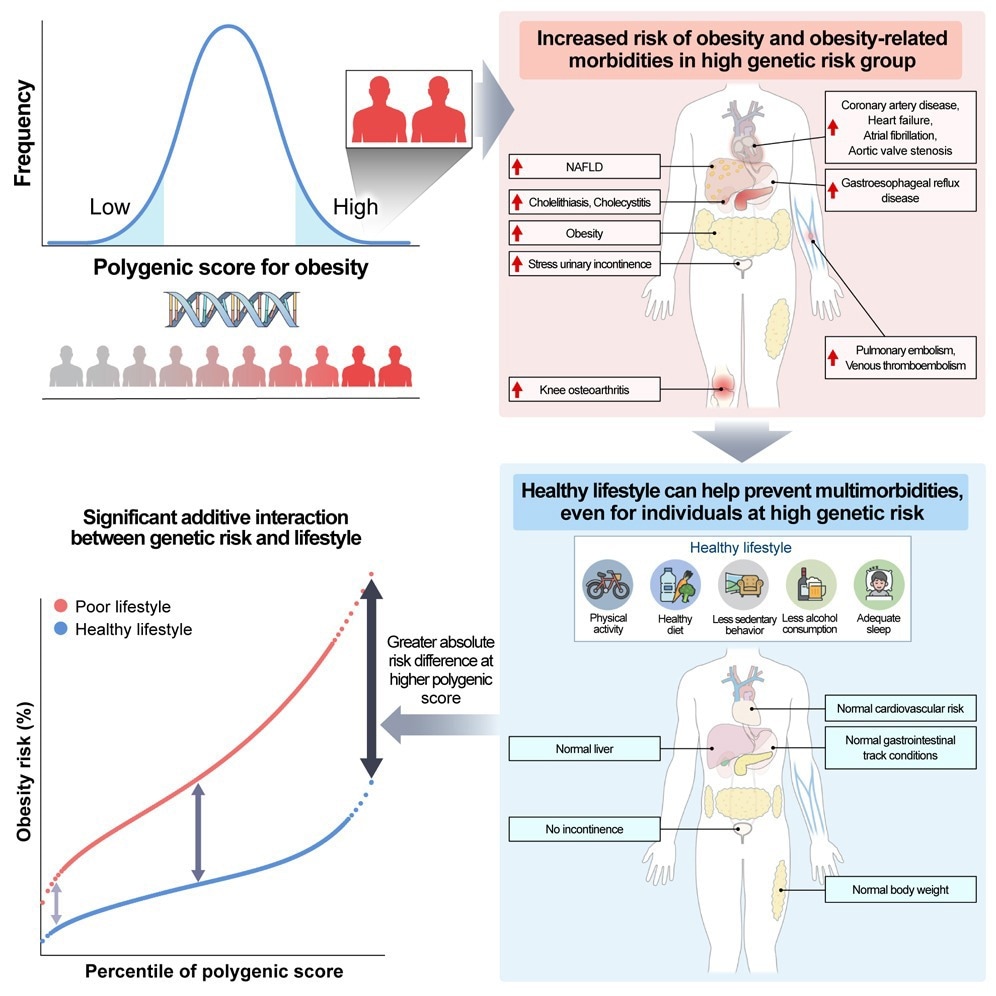Obesity is a non-infectious pandemic driven by sedentary lifestyles and elevated intake of energy-rich foods. Obesity is heritable and polygenic. Several metabolic pathways contribute to weight gain, with over a thousand genetic variants associated with obesity. It has been generally believed that the genetic predisposition to obesity is not modifiable.
However, gene-environment interaction studies have suggested that some lifestyle factors may attenuate the effect of specific obesity-related genes. Nevertheless, such studies were limited to a few obesogenic genes and lifestyle factors. Besides, it is unknown how modifiable lifestyle factors interact with genetic predisposition to obesity and alleviate its burden.
 Study: Association of genetic risk, lifestyle, and their interaction with obesity and obesity-related morbidities. Image Credit: Motortion Films / Shutterstock
Study: Association of genetic risk, lifestyle, and their interaction with obesity and obesity-related morbidities. Image Credit: Motortion Films / Shutterstock
About the study
In the present study, researchers examined whether modifiable lifestyle factors offset the genetic risk of obesity. They identified over 338,600 white British individuals from the United Kingdom Biobank who passed the genetic quality control and excluded > 1,000 subjects lacking data on body mass index (BMI) or obesity-related morbidities (ORMs), leaving 337,554 individuals for inclusion.
A polygenic score (PGS) was estimated based on a genome-wide association study for BMI in people of European ancestry. A healthy lifestyle score was computed from five obesogenic lifestyle factors (alcohol intake, sleep duration, sedentary behaviors, diet, and physical activity). The primary outcome was incident obesity, which was determined by analyzing the Biobank health data. Prevalent obesity was the secondary outcome and was defined as a baseline BMI ≥ 30 kg/m2.
Absolute risks were predicted by estimating odds (ORs) and hazard ratios (HRs) of prevalent and incident obesity by PGS percentile and lifestyle. HRs were estimated using Cox proportional hazard regression models, and ORs were assessed using a logistic regression model. Besides, the predicted probability of obesity by age 75 was calculated. Incident ORM was ascertained using hospital data, self-reports, or death registry records.
Interactions between genetic risk for obesity and lifestyle were evaluated using additive and multiplicative interaction analyses. Cox proportional hazard regression models examined the associations of lifestyle and genetic risk with incident obesity and ORMs. The association of lifestyle categories, genetic risk categories, or both with prevalent obesity was examined using multivariable logistic regression.

Graphical abstract
Findings
Obese individuals had a higher PGS and fewer healthy lifestyle factors. An unhealthy lifestyle and high genetic risk were jointly and independently associated with obesity. The team examined the isolated effect of genetic risk on obesity by adjusting for lifestyle groups and of lifestyle on obesity by adjusting for genetic risk groups.
A high genetic risk was associated with a heightened risk of incident and prevalent obesity, regardless of lifestyle groups. Likewise, poor lifestyle risk was associated with a higher risk of incident and prevalent obesity, independent of genetic risk. The HR of obesity in individuals with poor lifestyle and high genetic risk was 3.54 compared to those with a healthy lifestyle and low genetic risk.
Based on incident obesity, the median probability of obesity by age 75 was 2.8% in the poor lifestyle group and 1.7% in the healthy lifestyle group. The corresponding estimates based on prevalent obesity were 30.7% and 13.9%, respectively. Analysis of the relative excess risk due to the interaction between lifestyle and genetic risk revealed distinct additive interactions; multiplicative interaction analysis also produced consistent results.
Avoiding sedentary behavior was associated with the lowest odds of obesity, independent of genetic risk. Individuals with a healthy lifestyle and high PGS had risks of ORMs comparable to those with low PGS. By contrast, individuals with a poor lifestyle and high PGS had higher ORM risks. The association between PGS and ORM risks was null after adjusting for BMI.
Conclusions
In sum, adherence to a healthy lifestyle was associated with a lower risk of obesity and related morbidities. The absolute differences in the risk of obesity between those with and without healthy lifestyles widened as the PGS increased. A modifiable lifestyle and inherited genetic risk were jointly and independently associated with obesity.
Sedentary behavior was associated with a substantially higher obesity risk, suggesting that avoiding sedentary behaviors might be effective against obesity. Overall, adherence to healthy lifestyles could significantly counteract the genetic predisposition to obesity; as such, healthy lifestyles should be promoted regardless of genetic background.